#john roberts court
Text
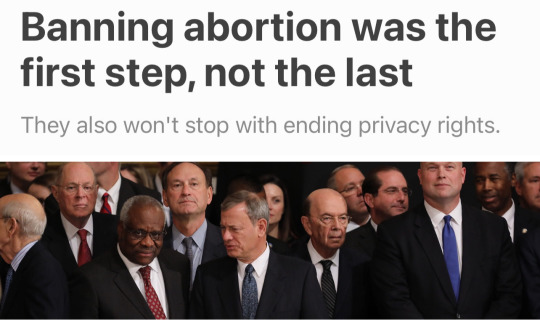
When the United States Supreme Court overturned Roe v. Wade in 2022’s Dobbs v. Jackson Women’s Health Organization, Justice Samuel Alito’s majority opinion smugly declared that “nothing in this opinion should be understood to cast doubt on precedents that do not concern abortion.” Alito mocked the dissent’s concern that getting rid of abortion would ultimately imperil things like access to contraception, saying the dissent was “designed to stoke unfounded fear that our decision will imperil those other rights.”
But as anti-choice politicians and activists are now deploying Dobbs to try to roll back decades of law about bodily autonomy, it’s clear the dissent’s fears were quite well-founded.
Conservatives are not going to stop at unwinding the constitutional right to privacy, which underpins things like the right to obtain birth control and the right of same-sex couples to marry. After they destroy the agency of half the population by imposing so-called “fetal personhood” laws, they’re coming for the modern welfare state.
The blueprint
Over at the hard-right Washington Examiner, Conn Carroll, a former comms person for both the Heritage Foundation and Utah Sen. Mike Lee, has a lengthy list of laws he’d like to get rid of — everything from Medicaid, to Head Start, to the Supplemental Nutrition Assistance Program. Those laws, he argues, “penalize marriage and encourage alternative family formation.” Carroll’s goals therefore dovetail not only with forced-birth conservatives but also with forced-marriage conservatives.
(continue reading)
#politics#scotus#republicans#project 2025#abortion#privacy rights#contraception#fetal personhood#bodily autonomy#reproductive rights#reproductive justice#roe v wade#republicans are evil#healthcare#forced birthers#john roberts court#john roberts#heritage foundation#mike lee#conn carroll
146 notes
·
View notes
Text

#Twitter#Alexandria ocasio cortez#Disturbing#Roberts court#Destroying#Fox news#Democrats#Supreme court#John roberts
531 notes
·
View notes
Text
This didn’t hit the right audience on tiktok so I’m giving it to you guys. You guys deserve this silly little piece of GOLD I made.
#earls court#led zeppelin#robert plant#jimmy page#classic rock#dazed and confused rah 1970#70s#rock and roll#60s#jimbert#john paul jones#bonzo#rock n roll is gay#classic rock fandom#tiktok
96 notes
·
View notes
Text

332 notes
·
View notes
Text
This is an important article by Linda Greenhouse, writing in The New York Times. Therefore, the link above is a gift 🎁 link, so anyone can read the article, even if they don't subscribe to the Times.
Below are some excerpts from the article:
To understand today’s Supreme Court, to see it whole, demands a longer timeline. To show why, I offer a thought experiment. Suppose a modern Rip Van Winkle went to sleep in September 2005 and didn’t wake up until last week. Such a person would awaken in a profoundly different constitutional world, a world transformed, term by term and case by case, at the Supreme Court’s hand.
To appreciate that transformation’s full dimension, consider the robust conservative wish list that greeted the new chief justice 18 years ago: Overturn Roe v. Wade. Reinterpret the Second Amendment to make private gun ownership a constitutional right. Eliminate race-based affirmative action in university admissions. Elevate the place of religion across the legal landscape. Curb the regulatory power of federal agencies.
[...}
That was how the world looked on Sept. 29, 2005, when Chief Justice Roberts took the oath of office, less than a month after the death of his mentor, Chief Justice Rehnquist. And this year? By the time the sun set on June 30, the term’s final day, every goal on the conservative wish list had been achieved. All of it. To miss that remarkable fact is to miss the story of the Roberts court.
It’s worth reviewing how the court accomplished each of the goals. It deployed a variety of tools and strategies. Precedents that stood in the way were either repudiated outright, as the Dobbs v. Jackson Women’s Health Organization decision did last year to Roe v. Wade and Planned Parenthood v. Casey, or were simply rendered irrelevant — abandoned, in the odd euphemism the court has taken to using. In its affirmative action decision declaring race-conscious university admissions to be unconstitutional, Chief Justice Roberts’s majority opinion did not overturn the 2003 Grutter decision explicitly. But Justice Thomas was certainly correct in his concurring opinion when he wrote that it was “clear that Grutter is, for all intents and purposes, overruled.”
Likewise, the court has not formally overruled its Chevron decision. Its administrative-law decisions have just stopped citing that 1984 precedent as authority. The justices have simply replaced Chevron’s rule of judicial deference with its polar opposite, a new rule that goes by the name of the major questions doctrine. Under this doctrine, the court will uphold an agency’s regulatory action on a major question only if Congress’s grant of authority to the agency on the particular issue was explicit. Deference, in other words, is now the exception, no longer the rule.
But how to tell a major question from an ordinary one? No surprise there: The court itself will decide.
[...]
My focus here on what these past 18 years have achieved has been on the court itself. But of course, the Supreme Court doesn’t stand alone. Powerful social and political movements swirl around it, carefully cultivating cases and serving them up to justices who themselves were propelled to their positions of great power by those movements. The Supreme Court now is this country’s ultimate political prize. That may not be apparent on a day-to-day or even a term-by-term basis. But from the perspective of 18 years, that conclusion is as unavoidable as it is frightening.
#us supreme court#18 years of the roberts' court#chief justice john roberts#affirmative action#second amendment#separation of church and state#regulatory agencies#women's reproductive health#linda greenhouse#the new york times#gift link
133 notes
·
View notes
Text
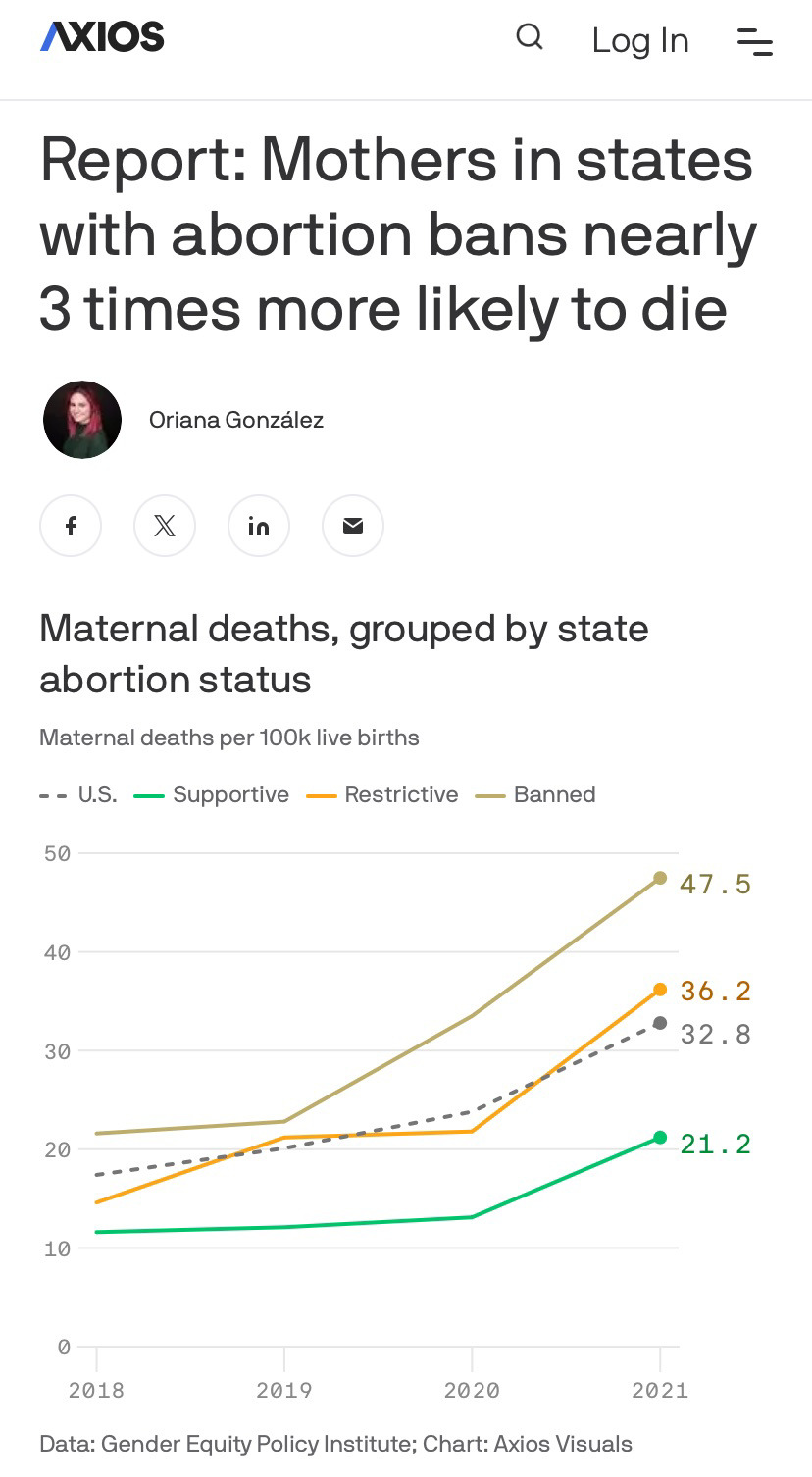
Abortion bans brutally triple maternal deaths it’s a betrayal of their right to live.
Republicans want women dead.
#supreme court#roe v wade#clarence thomas#samuel alito#neil gorsuch#amy coney barrett#john roberts#brett kavanaugh#republicans#democrats#Biden#trump#abortion#america#usa#politics#news#qsmp#art
27 notes
·
View notes
Link
From the December 31, 2023 article:
Chief Justice John G. Roberts Jr. did not address any of those contemporary issues Sunday in his annual “Year-end Report on the Federal Judiciary.” Instead, he looked back on technological advancements in the nation’s court system, detailing developments from the quill pens used by justices in the 19th century to electronic databases of the 1980s to online trial proceedings prompted by the coronavirus pandemic.
Roberts, a history buff, also expounded on the potential for artificial intelligence to both enhance and detract from the work of judges, lawyers and litigants. For those who cannot afford a lawyer, he noted, AI could increase access to justice.
...
Roberts used his year-end wrap-up, released by tradition on New Year’s Eve, in part to thank the court system’s technologists and cybersecurity experts. Those experts, he said, keep the judicial branch running behind-the-scenes and answer calls from judges, including Roberts, who said he has “been known to call on help desk staff for urgent and essential assistance.”
Roberts did not mention that this time last year the court was finishing its investigation into the shocking leak of Justice Samuel A. Alito Jr.'s draft opinion that eventually overturned a half-century of abortion rights. The court’s investigative report released last January did not determine the identity of the leaker. While the court’s IT experts did not rule out a hack, the report said there was no evidence to suggest improper access to the court’s IT networks.
24 notes
·
View notes
Text
SCOTUS is corrupt.
It genuinely seems every Justice, liberal or conservative, could sit outside the court with a large sign saying “Bribe me!” with literally no consequences.
Gee, letting 9 flawed with political connections people have total power to decide on the rights of 200 million people was a bad idea in the first place.
Who could have foreseen this totally likely scenario?
65 notes
·
View notes
Text

#earl's court#1975#led zeppelin#70s#classic rock#rock#hard rock#1970s#jimmy page#robert plant#john bonham#john paul jones#by dee dee
83 notes
·
View notes
Text
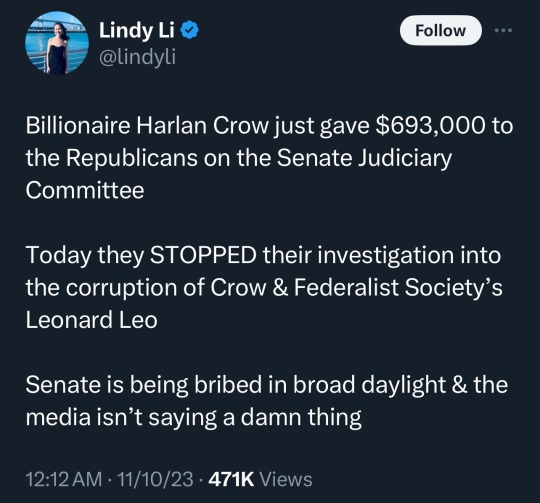
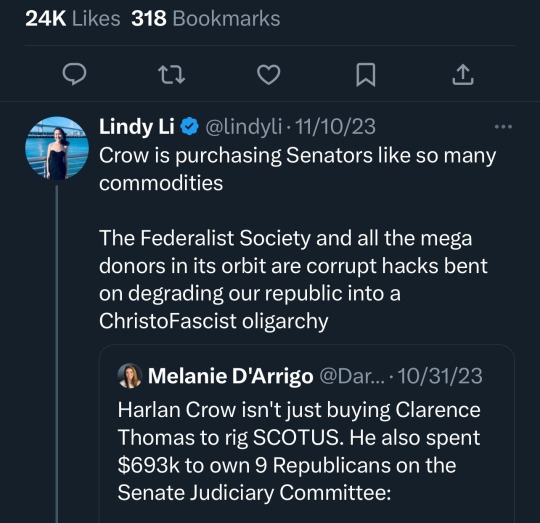
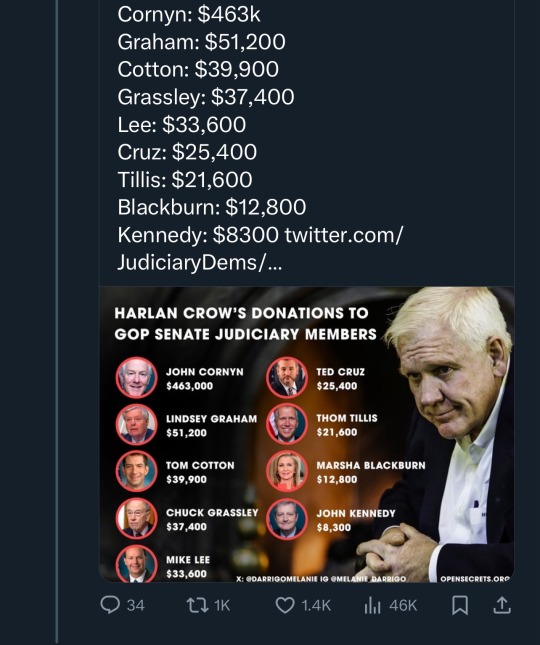

The Senate Judiciary Committee on Thursday walked back a planned vote to subpoena two megadonors connected to Supreme Court Justices Clarence Thomas and Samuel Alito. The reason? Republicans threw a fit.
Democrats on the Judiciary Committee finally took the first step last week to address the high court’s ethics crisis and announced they would seek to subpoena Republican billionaire megadonor Harlan Crow and ultraconservative activist Leonard Leo. Both men feature prominently in the ethics scandal for their relationships with Thomas and Alito. The committee said it would also seek to subpoena wealthy GOP donor Robin Arkley II.
But Chair Dick Durbin appeared to put that all on hold on Thursday, when he abruptly ended a committee meeting after outraged Republicans threatened to retaliate if Crow and Leo were subpoenaed.
(continue reading)
#politics#republicans#clarence thomas#harlan crow#scotus#the federalist society#leonard leo#crony capitalism#john roberts court#roberts court#john roberts
153 notes
·
View notes
Text
The Republicans could lose several seats in the House of Representatives due to a surprise Supreme Court ruling which will create a new Black majority district in Alabama, according to a new study.
On Thursday the Supreme Court backed a lower court's ruling, by five votes to four, which found the districts drawn up by the state violate Section 2 of the Voting Rights Act, which prohibits "discrimination on the basis of race" in the electoral process. Chief Justice John Roberts and Brett Kavanaugh, both widely regarded as conservatives, voted with the court's three liberal members to deliver the result.
The ruling means the boundaries of Alabama's seven House districts will need to be redrawn ahead of the 2024 congressional elections, in a move that is expected to benefit the Democrats. It will also increase pressure on other Republican states to follow suit, strengthening the Democratic position in North Carolina and Louisiana.
The Cook Political Report, a non-partisan analytics website, updated its ratings for five House districts following the ruling.
Alabama's 1st and 2nd congressional districts, currently represented by Republicans Jerry Carl and Barry Moore respectively, have been changed from "solid Republican" to "toss up."
The same has happened to Louisiana's 5th and 6th districts, putting seats currently held by Republicans Julia Letlow and Garret Graves, at risk to the Democrats.

Finally North Carolina's 1st congressional district, which is occupied by Democrat Don Davis, transitions from "toss up" to "lean Democrat."
However the Cook Political Report does add a caveat to its predictions, commenting: "Until courts or legislatures enact remedial plans, it's difficult to predict exactly which Republican incumbents will be impacted."
The Supreme Court's decision could open the door to additional legal challenges in other states whose maps have faced contention from critics arguing they purposefully dilute minority voters to favor Republicans. Louisiana and Georgia—whose state legislatures passed redistricting plans with similar characteristics to Alabama's—could face renewed legal challenges to their maps on the grounds they disproportionately diminish the power of the state's voters.
Thursday's court ruling was welcomed by President Joe Biden, who repeated calls for Congress to pass wider ranging voting reform.
"Today's decision confirms the basic principle that voting practices should not discriminate on account of race, but our work is not done," he commented.
However Alabama Attorney General Steve Marshall insisted the state will continue the fight, stating: "Although the majority's decision is disappointing, this case is not over."
Derrick Johnson, president of civil rights group the National Association for the Advancement of Colored People (NAACP) saluted the decision as "a victory for Black America and a triumph for our democracy."
#us politics#news#Newsweek#2023#us supreme court#scotus#us house of representatives#republicans#conservatives#gop#Alabama#North Carolina#Louisiana#Cook Political Report#Voting Rights Act#justice john roberts#justice brett kavanaugh#rep. Jerry Carl#rep. Barry Moore#rep. Julia Letlow#rep. Garret Graves#Rep. Don Davis#Steve Marshall#National Association for the Advancement of Colored People#voting reform
45 notes
·
View notes
Text
is it just me, or is robert trying to act ridiculously adorable and pretty and cute and absolutely irresistible?
(this is a clip of ‘going to california’ live at earls court, 1975)
#70s#classic rock#jimmy page#led zeppelin#robert plant#60s#john paul jones#rock and roll#bonzo#jimbert#earls court#going to california#folk rock#john bonham#jpj
203 notes
·
View notes
Text
For over 20 years, Supreme Court Justice Clarence Thomas accepted luxury gifts from GOP megadonor Harlan Crow that included vacations on Crow’s superyacht and trips on the billionaire’s private jet as well as a week each summer at Crow’s private resort in the Adirondacks.
Source
172 notes
·
View notes
Text
Jamelle Bouie does a good job of underscoring just how fed up Justice Elena Kagan is with the decisions coming from the right-wing justices on the court, and why she questions the constitutionality of Roberts' majority opinion in Biden v. Nebraska (the student loan forgiveness case). Here are some excerpts from Bouie's NY Times newsletter:
But I don’t want to discuss Roberts’s majority opinion [in Biden v. Nebraska] as much as I do Justice Elena Kagan’s dissent. Kagan wrote something unusual. She didn’t just challenge the chief justice’s reasoning, she questioned whether the court’s decision was even constitutional.
“From the first page to the last, today’s opinion departs from the demands of judicial restraint,” Kagan wrote. “At the behest of a party that has suffered no injury, the majority decides a contested public policy issue properly belonging to the politically accountable branches and the people they represent.”
She continued: “That is a major problem not just for governance, but for democracy too. Congress is of course a democratic institution; it responds, even if imperfectly, to the preferences of American voters. And agency officials, though not themselves elected, serve a President with the broadest of all political constituencies. But this Court? It is, by design, as detached as possible from the body politic. That is why the Court is supposed to stick to its business — to decide only cases and controversies, and to stay away from making this Nation’s policy about subjects like student-loan relief.”
The court, Kagan concluded, “exercises authority it does not have. It violates the Constitution.”
[...]
Kagan’s dissent, in other words, is a call for accountability. For Congress, especially, to exercise its authority to discipline the court when it oversteps its bounds.
Democrats may or may not get this particular message. But John Roberts heard it loud and clear. “It has become a disturbing feature of some recent opinions to criticize the decisions with which they disagree as going beyond the proper role of the judiciary,” he wrote in his opinion. “It is important that the public not be misled either. Any such misperception would be harmful to this institution and our country.”
For Roberts, the problem isn’t that the Supreme Court is overstepping its bounds, it’s that one of its justices has decided that she’s had enough.
[emphasis added]
#justice elena kagan#chief justice john roberts#biden v nebraska#lack of standing#unconstitutional supreme court ruling#student loan forgiveness#jamelle bouie#the new york times
134 notes
·
View notes
Link
46 notes
·
View notes
Quote
[John] Roberts' ploy of throwing a few small fish to lessen the violence of the upcoming rape of the law is so transparent. In some ways it's the Affirmative Action of Jurisprudence, in that so many cases are given to prove they're just calling balls and strikes. Yeah, right. Throwing a few morsels at the left to compensate for the bombshell to come calls into question the legitimacy of all their decisions. At the least, it is an admission that the bombshell on the horizon is on dubious legal grounds and that Roberts is trying to lessen the damage to their credibility. Or at worst, it says that their decisions are merely arbitrary and that rulings are not made by sound legal theory but rather for the outcome the "Justices" wish to achieve. All that's left now for Roberts and his trolls to do is to start physically destroying the Court building as they flutter and flap to delegitimization.
D.E. in Lancaster, PA in Electoral-vote.com
27 notes
·
View notes